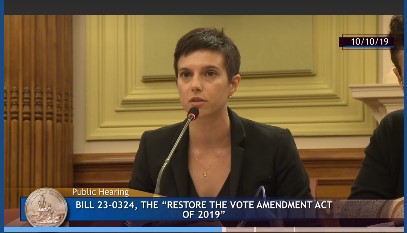Re-Entry Clinic Director, Visiting Professor Margaret Martin Barry, Testifies for Felon Voting Rights in DC
July 13, 2020
On July 7, 2020, the DC Council voted to make the District of Columbia the first jurisdiction to restore voting rights to incarcerated residents with felony convictions. This significant democratic milestone comes after a testimony in support of the Bill by Visiting Professor Margaret Martin Barry, director of the Re-Entry Clinic at American University Washington College of Law.
.jpg)
Last October, Barry advocated for Bill 23-0324 – The Restore the Vote Act – before the DC Council, with the assistance from her Dean’s Fellow, 1L Xena Hinton. The testimony noted that in DC, 46.4% of the general population is black, while approximately 97% of all inmates are black.
The felony disenfranchisement of black individuals after the Civil War was used to suppress the African-American vote, Barry said.
“[The] laws barring those incarcerated on felony convictions from voting are widely considered vestiges of the same policies simply reworded to appear less explicitly racist. Today, black voters remain inordinately impacted by felony disenfranchisement laws. Of the 6.1 million citizens without the right to vote because of felony disenfranchisement laws, approximately 2.4 million are black,” Barry and Hinton wrote.
Because of this, Barry concluded, “The Bill serves the community by providing a vehicle for a significant portion of the population to exercise their rights as citizens and reminds the community and its elected officials that the humanity of those we convict as felons does not end with that determination.”

In his official statement following the Bill’s passing, DC Councilmember At-Large and AUWCL alum Robert C. White, Jr. ’07 underscored the connection between stripping voting rights from incarcerated individuals and other Jim Crow-era voter suppression efforts.
“We [sic] realized that voting is the most basic right of a democracy and that our city and our country are better if all our residents can participate in our governance and hold elected officials accountable on important issues like mass incarceration and prison abuse,” White said.